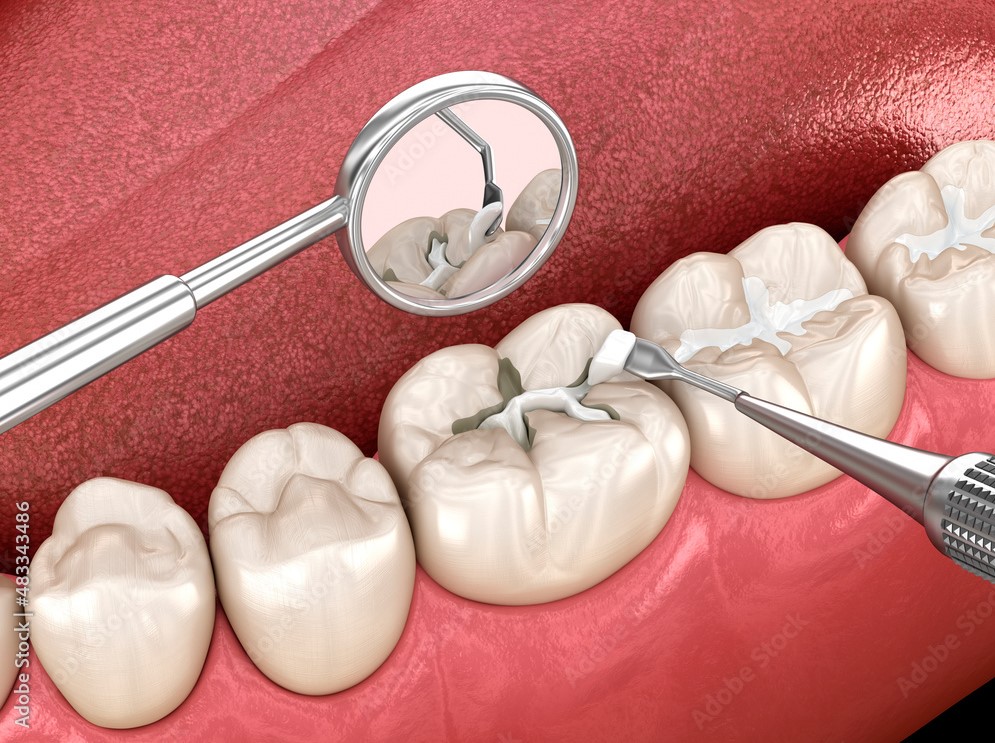FISSURE SEALANTS
Restorative Dental Care in Merrylands
Fissure Sealants
Fissure sealants are thin, plastic coatings applied to the chewing surfaces of molars and premolars to protect them from decay. These back teeth have pits and grooves (fissures) where food particles and bacteria can easily get trapped, leading to cavities. The sealant forms a protective barrier that smooths out these surfaces, making them easier to clean and less likely to develop cavities. Fissure sealants are a simple and painless preventive measure, especially for children, to help maintain good oral health.
Preparation
The tooth is cleaned and dried thoroughly to remove any plaque or debris. Etching may be performed to create a rough surface for better adhesion of the sealant.
Application
The fissure sealant material is applied to the pits and grooves of the tooth. It flows into the deep crevices and forms a protective coating over the tooth surface.
Curing
A special light is used to harden the sealant and bond it to the tooth. This process, known as curing, ensures that the sealant forms a strong, durable barrier against decay.
Home Care Tips
Maintain good oral hygiene by brushing your teeth twice a day with fluoride toothpaste and flossing daily. Avoid sticky and hard foods that could damage the sealants, and consider using a fluoride mouthwash for added protection. Attend regular dental check-ups to ensure the sealants are intact and your teeth and gums are healthy. If you grind your teeth, use a mouthguard at night to protect the sealants. Keep an eye on the sealants and contact your dentist if you notice any issues.
Frequently Asked Questions
How long do fissure sealants last, and do they require any special care?
Fissure sealants can last for several years, with proper care and maintenance. They may need to be checked during regular dental visits and replaced if they become worn or damaged. Special care involves avoiding sticky and hard foods that can damage the sealants and maintaining good oral hygiene through regular brushing and flossing. Following these guidelines can help prolong the effectiveness of fissure sealants in protecting your teeth against decay.
What are the benefits of fissure sealants compared to other preventive treatments?
Fissure sealants provide a protective barrier that seals off the deep grooves and pits on the chewing surfaces of teeth, preventing bacteria and food particles from accumulating and causing decay. Compared to other preventive treatments like fluoride treatments or dental fillings, sealants are non-invasive and do not require drilling or removing any tooth structure. They are also cost-effective and can last for several years, providing long-term protection against cavities.
Are there any risks or side effects associated with fissure sealants?
While fissure sealants are generally safe, there are some potential risks and side effects. These can include an allergic reaction to the sealant material, though this is rare. There’s also a slight risk of the sealant becoming dislodged or wearing off over time, which may require reapplication. Additionally, if the sealant is not applied properly, it could trap bacteria and lead to decay. Regular dental check-ups can help detect and address any issues with sealants early.
How often should I schedule follow-up appointments after getting fissure sealants?
After getting fissure sealants, it’s recommended to schedule follow-up appointments every six months or as advised by your dentist. These appointments allow your dentist to check the condition of the sealants and your overall oral health. If any issues are detected, such as wear or damage to the sealants, they can be addressed promptly to ensure continued protection against cavities.